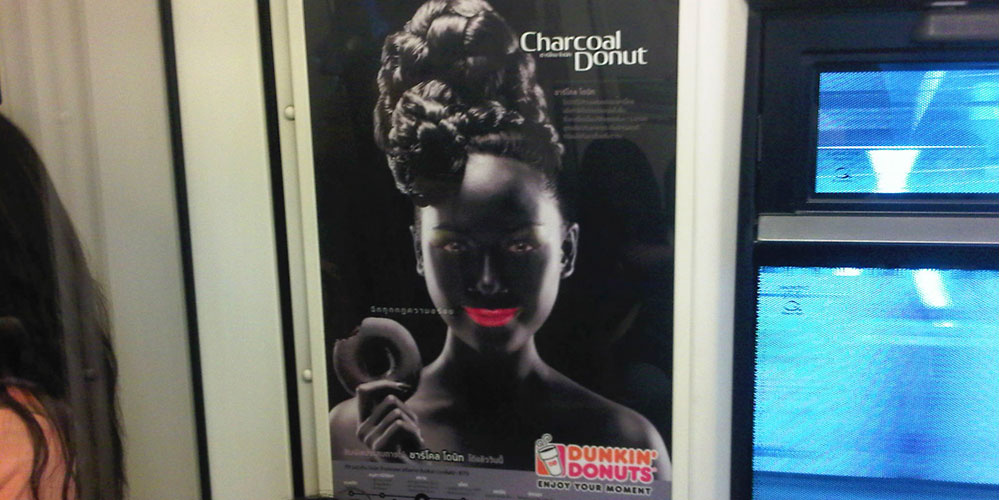Dunkin’ Donuts apologizes for blackface advert

An advertisement poster of a smiling woman with bright pink lips in blackface makeup holding a doughnut is seen on a Skytrain, a commuter train in Bangkok, Thailand, Friday, Aug. 30, 2013. A leading human rights group has called on Dunkin’ Donuts to withdraw the “bizarre and racist” advertisement for chocolate doughnuts in Thailand. The Dunkin’ Donuts franchise in Thailand launched a campaign earlier this month for its new “Charcoal Donut” featuring the image, which is reminiscent of 19th and early 20th century American stereotypes for black people that are now considered offensive symbols of a racist era. AP
BANGKOK — Dunkin’ Donuts has apologized for the “insensitivity” of an advertising campaign in Thailand featuring a woman in blackface makeup to promote a new chocolate flavored doughnut.
The Dunkin’ Donuts franchise in Thailand came under criticism Friday after Human Rights Watch called the advertisements “bizarre and racist.”
The company’s chief executive in Thailand initially defended the campaign, but the U.S. headquarters quickly followed up with an apology.
“We are working with our Thailand franchisee to immediately pull the ad. DD recognizes the insensitivity of this spot,” Dunkin’ Donuts said in a tweet posted on its official U.S. website after complaints erupted on Twitter, in a variety of blogs and in mainstream American media.
The local franchise launched the advertisement earlier this month to promote its new “Charcoal Donut.” In posters, TV commercials and on Facebook, the campaign shows a smiling woman with blackface makeup, bright pink lipstick and a jet black 1950s-style beehive hairdo holding up a bitten black doughnut. The slogan in Thai reads: “Break every rule of deliciousness.”
Article continues after this advertisementCritics say the image is reminiscent of 19th and early 20th century American stereotypes for black people that are now considered offensive symbols of a racist era.
Article continues after this advertisementThe New York-based Human Rights Watch said it was shocked to see an American brand name running an advertising campaign that would draw “howls of outrage” if released in the United States.
“It’s both bizarre and racist that Dunkin’ Donuts thinks that it must color a woman’s skin black and accentuate her lips with bright pink lipstick to sell a chocolate doughnut,” said Phil Robertson, the deputy Asia director for Human Rights Watch. “Dunkin’ Donuts should immediately withdraw this ad, publicly apologize to those it’s offended and ensure this never happens again.”
The campaign hasn’t ruffled many in Thailand, where it’s common for advertisements to inexplicably use racial stereotypes. A Thai brand of household mops and dustpans called “Black Man” uses a logo with a smiling black man in a tuxedo and bow tie. One Thai skin whitening cream runs TV commercials that say white-skinned people have better job prospects than those with dark skin. An herbal Thai toothpaste says its dark-colored product “is black, but it’s good.”
Hours before the apology was issued by Dunkin’ Donuts headquarters, the company’s chief executive in Thailand dismissed the criticism as “paranoid American thinking.”
“It’s absolutely ridiculous,” the CEO Nadim Salhani said in a telephone interview. “We’re not allowed to use black to promote our doughnuts? I don’t get it. What’s the big fuss? What if the product was white and I painted someone white, would that be racist?”
Salhani said that the Thai franchise of Dunkin’ Donuts operates independently of the American operation and that doughnut sales have increased about 50 percent since the campaign was launched around two weeks ago, which he attributed to curiosity about the new advertisements.
“Not everybody in the world is paranoid about racism,” said Salhani, a Lebanese expatriate in Thailand who said his teenage daughter was the model featured in the campaign. “I’m sorry, but this is a marketing campaign, and it’s working very well for us.”